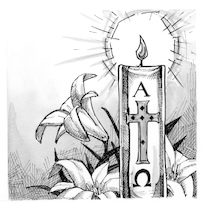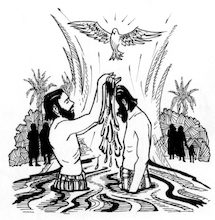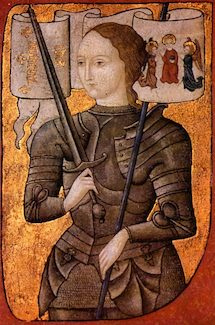Weekly Winner
Congratulations, Dennis Vlasak, our winner for May 19
Dennis will receive a copy of Great People of the Bible student book and the accompanying catechist guide, a $28.90 value.
Bring Salvation History to Life! Parish leaders have been requesting a Catholic Bible study curriculum for middle school students, created specifically to fit their parish schedules. Saint Mary’s Press is pleased to respond to this need with the Great People of the Bible parish curriculum.
The Great People of the Bible curriculum offers:
- A student book that is in conformity with the Catechism of the Catholic Church as a supplemental curriculum resource, and the only Bible curriculum for middle school students with this approval
- Twenty-five one-hour sessions designed to fit a typical parish calendar
- A catechist guide that offers easy-to-follow session outlines for the volunteer catechist
- Flexible options for the catechist to complete student activities in class or use as family learning assignments in the home
- One student book that covers both the Old and New Testament and that supports the ABC’s of biblical literacy
- Engaging student activities, now with expanded background content, based on the ever-popular Student Activity Workbooks for Breakthrough! The Bible for Young Catholics
Great People of the Bible
ISBN: 978-0-88489-690-6, paper, 56 pages
Focus on Faith
Celebrate the Easter Sacraments!
 by Joanna Dailey
by Joanna Dailey
It’s time to celebrate the Easter sacraments: Baptism, Confirmation, Eucharist! Whether celebrated together at the Easter Vigil or separately, now is the season to rejoice in God’s gift to us of his life and love!
Here in Terre Haute, we had Confirmation yesterday. The bishop usually comes only every two years, so this year’s Confirmation group included both seniors and sophomores from two clusters of parishes. Auxiliary Bishop Coyne presided at two Confirmations—one at 2 p.m. and another at 5 p.m.—in two different parish churches.
The teen group of freshmen I had started with as a small-group helper four years ago are now seniors and were being confirmed. (Most of them, that is. I noticed, sadly, that some were among the missing. So the Holy Spirit will have to catch them at another time.) In our religious ed program at the high school level, I did not stay with the same group all four years, but these were "my first group" and so were special to me.
During the ceremony I wanted to call out (but of course did not): Remember this day! Take note of this day! Celebrate this day always!
Anniversaries are important. Birthdays, wedding anniversaries, jubilee celebrations of ordination or religious vows—all of these are memorials of Christ’s presence and gifts in our lives. In some sense, they re-create the original event and yet add their own special historical "seal of approval" to what happened on that very first day—that day of birth, that day of vowed commitment, that day of Baptism or Confirmation or First Eucharist.
I always loved that Irish saying, "Look at me now and the day you met me." I didn’t understand it when I first heard it, but someone explained, "It means: look how much better I am since I have known you." This is another reason to celebrate anniversaries, especially sacramental anniversaries like Baptism and religious profession, Confirmation, Eucharist, Matrimony, and Ordination.
On these days, we have met Christ in a unique way, unique to ourselves and to our own lives. And since that day, we have been graced and blessed with gifts, some recognized and some hidden from our eyes. What’s not to celebrate? "Look at me now, Lord, and the day you met me!"
To me, it is almost a catechetical mandate that we encourage our students to find out their baptismal anniversaries, as well as their dates of First Eucharist and Confirmation. (Unfortunately, my date of First Penance is lost in time. I suppose I could write to my parish at the time and find it. First Forgiveness is certainly something to celebrate, too.) Some teachers and catechists have a baptismal renewal ceremony once a month for all those who were baptized in that month. You will find a short Renewal of Baptismal Promises ceremony in the Make It Happen in this newsletter.
My anniversaries? Baptism, April 13. First Communion, May 8. Confirmation, May 12.
Find out your dates. And happy anniversaries to you!
Blessings on your ministry!
Peace and joy,
Joanna
P.S. The Servant Leader is going on vacation. You will be receiving this newsletter only once a month during the summer. Look for it in your electronic mailbox on June 16, July 14, and August 18. Happy summer!
Make It Happen
A Monthly Baptismal Renewal Ceremony
Overview
Baptismal anniversary dates for the month should be posted in a prominent place. At an appropriate time during the month, this short ceremony could be held, perhaps as the opening prayer of the class. This ceremony will remind everyone of their dignity as children of God, and will be an encouragement to their daily living as followers of Christ. The teacher should act as Leader.
Materials Needed
-
A copy of the baptismal promises (the version with questions and the response: "I do.").
-
A large white candle placed in a prominent position and lit, to recall the Paschal Candle.
-
Candles (real or electric) for each student renewing their promises.

Leader: We have gathered here to celebrate the baptismal commitments of (name student or students), who was (were) baptized in this month. Will those renewing their baptismal commitments please come forward?
(Students renewing their baptismal promises come to the front of the room.)
Leader: (Lights each candle from the large white candle, or hands a lighted electric candle to each student).
Leader: We celebrate the anniversary of your Baptism with you today, and we witness your renewal of your baptismal promises. And so I ask you:
(Leader asks the question form of the baptismal promises from the Roman Missal. Students renewing their promises answer, "I do.")
Leader: Let us, as a witnessing community, affirm your renewal today. (All clap hands.) May you always walk in the light of Christ and follow him as true disciples.
All: Amen.
(Students walk back to their places, blow out the candles, and then return them to the teacher. Refreshments may be served.)
Break Open the Word
The Sixth Sunday of Easter and The Ascension of the Lord
The Sixth Sunday of Easter
May 25, 2014
John 14:15-21
Opening Prayer
- Jesus, we thank you for the gift of the Holy Spirit, who lives among us. Through the power of your Spirit, continue to pour your grace upon us. Give us the strength to keep your commandments. Amen.
Context Connection
This Sunday's Gospel is a continuation of last Sunday's Gospel. Jesus is still responding to Philip's request: "Lord, show us the Father, and we will be satisfied" (14:8). Remember that Jesus told his disciples that they already know the Father because they know him, "I [Jesus] am in the Father and the Father is in me" (14:11). So when Jesus says, "If you love me, you will keep my commandments" (14:15), he speaks of the love the disciples should have for him and the Father. The love of God is the reason for keeping God's commandments. We learn that Jesus and the Father will not abandon the disciples, because of their love for the disciples. In fact, Jesus promises this: "I will ask the Father, and he will give you another Advocate, to be with you forever" (14:16). In 1 John 2:1, John refers to Jesus as the disciples' first advocate with the Father. Jesus wants his disciples to know that when the time comes for him to return to the Father, they--Jesus and the Father--will send another Advocate to be among them. This Advocate, this mediator, this Paraclete, is the Holy Spirit, the third person of the Holy Trinity.
Jesus' departure does not result in God's absence; rather, it is a continuation of his presence through the Holy Spirit. Jesus is the first mediator, but through the Holy Spirit Jesus will come back as promised and remain. Therefore the disciples who love Jesus will be loved in return by the Father and the Son through the Holy Spirit: "They who have my commandments and keep them are those who love me; and those who love me will be loved by my Father, and I will love them and reveal myself to them" (14:21). Jesus continues to reveal himself through his love relationship with his followers who keep the commandments. In the future, after Jesus returns to the Father, this will be mediated by the Holy Spirit. All disciples can hope to dwell with Jesus in the future. He will remain with them through the Holy Spirit's dwelling in each disciple. The Spirit among us is a source of hope.
Obedience to Jesus is the way the disciples show their love for Jesus. This Sunday's Gospel begins and closes with an urging to keep Jesus' commandments. Obeying Jesus is both the proof of love and the condition necessary for receiving the Holy Spirit. The word obedience comes from two Latin words, ob, meaning "toward," and audire, meaning "to hear." Obedience is turning one's ear toward the commandments of Jesus to hear them clearly and to allow them to set the direction for one's life. Jesus prepares the disciples for the time when he will no longer be among them in a physical body. He desperately wants them to understand that he has not abandoned them, even though he is gone. "I will not leave you orphaned" (14:18). The physical absence of Jesus will be overcome by the never-ending presence of the Holy Spirit. Jesus' going away will usher in a new era marked by the gifts of the Holy Spirit present among the believing community. This new era will be made manifest through love--the keeping of Jesus' commandments--and the hope that God the Father and God the Son will abide forever with the faithful disciples, as he promised.
Tradition Connection
The Old Testament prophets announced that the Spirit of God would rest upon the Messiah that they hoped for. A sign of the Messiah was that God's Spirit resided with him. The Spirit of the Lord rested upon Jesus from his very moment of conception.
In the Old Testament the prophets announced that the Spirit of the Lord would rest on the hoped-for Messiah for his saving mission.1 The descent of the Holy Spirit on Jesus at his baptism by John was the sign that this was he who was to come, the Messiah, the Son of God. 2 He was conceived of the Holy Spirit; his whole life and his whole mission are carried out in total communion with the Holy Spirit whom the Father gives him "without measure" 3 (Catechism of the Catholic Church, paragraph 1286).
This Spirit of God that Jesus experiences is not a gift from God that he keeps for himself; rather, he shares it with all who keep his commandments. This outpouring of the Father's love without measure is now passed on to Jesus' disciples.
This fullness of the Spirit was not to remain uniquely the Messiah's, but was to be communicated to the whole messianic people.4 On several occasions Christ promised this outpouring of the Spirit, 5 a promise which he fulfilled first on Easter Sunday and then more strikingly at Pentecost. 6 Filled with the Holy Spirit, the Apostles began to proclaim "the mighty works of God," and Peter declared this outpouring of the Spirit to be the sign of the messianic age. 7 Those who believed in the apostolic preaching and were baptized received the gift of the Holy Spirit in their turn 8 (Catechism, paragraph 1287).
The Spirit of God through Jesus continues to be poured out upon those who love Jesus and keep his commandments.
Wisdom Connection
Jesus' promise to the disciples that he would not leave them orphans and that he would send the Holy Spirit as his presence among his followers is a promise for disciples of every generation. The physical absence of Jesus is overcome by the never-ending presence of the Holy Spirit. Even though the never-ending presence of God is made manifest through the Holy Spirit, we believe that in worship, especially in the Eucharistic experience, the absent one, Jesus, is present. He is present in the bread and wine that are transformed into the Body and Blood of Jesus.
Acknowledgments
The scriptural quotations contained herein are from the New Revised Standard Version of the Bible, Catholic Edition. Copyright © 1993 and 1989 by the Division of Christian Education of the National Council of the Churches of Christ in the United States of America. All rights reserved.
The quotations labeled Catechism are from the English translation of the Catechism of the Catholic Church for use in the United States of America. Copyright © 1994 by the United States Catholic Conference, Inc.--Libreria Editrice Vaticana. Used with permission.
Endnotes cited in quotations from the Catechism of the Catholic Church
- Cf. Isaiah 11:2; 61:1; Luke 4:16-22.
- Cf. Matthew 3:13-17; John 1:33-34.
- John 3:34.
- Cf. Ezekiel 36:25-27; Joel 3:1-2.
- Cf. Luke 12:12; John 3:5-8; 7:37-39; 16:7-15; Acts 1:8.
- Cf. John 20:22; Acts 2:1-4.
- Acts 2:11; cf. 2:17-18.
- Cf. Acts 2:38.
The Ascension of the Lord
June 1, 2014
Matthew 28:13-20
Opening Prayer
- Jesus, on a mountaintop in Galilee you promised your disciples that you would be with your Church always. Give us the eyes of faith to see your presence in our world each and every day of our lives. Amen.
Context Connection
This Sunday's Gospel, in observance of the feast of the Ascension of Jesus, concludes the Gospel of Matthew. In Matthew's account of the Resurrection (which was the Gospel reading for the Easter Vigil), Jesus rises from the dead on Easter morning and greets the women who have come to see the tomb (28:1-10). Jesus instructs the women to tell the disciples to go to Galilee, to the predetermined place on a mountain. The disciples leave Jerusalem immediately and travel to Galilee. Matthew's Gospel differs from John's Gospel (which we have been reading since Easter) in that John's Gospel has many post-Resurrection appearances of Jesus. Matthew's account also differs from the one found in the Acts of the Apostles, which states that Jesus ascended into heaven 40 days after the Resurrection (Acts 1:3), from Mount Olivet (Acts 1:12) near Jerusalem.
The conclusion of Matthew's Gospel makes three profound statements about the authority of Jesus, the commission of the disciples, and the promise of Jesus' abiding presence. The encounter with Jesus on the mountain in Galilee, according to Matthew, was the disciples' first experience of the risen Jesus. Some embraced him, "when they saw him, they worshiped him," whereas other disciples were apprehensive, "some doubted" (28:17). In this instance it is Jesus who comes to the disciples, whereas in other parts of Matthew it is the disciples who come to Jesus. Jesus shares with the disciples a profound truth about himself: "All authority in heaven and on earth has been given to me" (28:18). The risen Jesus has been given supreme authority over the universe, all power in heaven and on earth, by his heavenly Father because of his obedience--even unto death.
Based on his universal power, Jesus then commissions the disciples to carry on his work here on earth: "Go therefore and make disciples of all nations, baptizing them in the name of the Father and of the Son and of the Holy Spirit, and teaching them to obey everything that I have commanded you" (28:19-20). Everyone is invited to be disciples of Jesus Christ, not just the Jews. The words Jesus used when he commissioned the disciples and told them to baptize all nations are the same words used in Baptism today.
Finally, Jesus promises that he will always be with his followers: "Remember, I am with you always, to the end of the age" (28:20). This last verse recalls verse 23 in chapter one of Matthew: "'Look, the virgin shall conceive and bear a son, and they shall name him Emmanuel,' which means, 'God is with us.'" Jesus' promise to be continuously present to the disciples in every generation brings to fulfillment Jesus' name Emmanuel--God is always with us. The Spirit of God will guide and protect the Church at all times.
Tradition Connection
The feast of the Ascension of the Lord celebrates what we are and will be as the Church. The focus is on Jesus' presence, through the Holy Spirit in the midst of the Church, rather than on Jesus' departure and return to the Father. The risen Jesus is no longer limited by space or time. Jesus returns to the Father so that he can be present through the Holy Spirit and in the Sacraments.
The mandate of the Church, which is missionary in nature, is based on these words of Jesus: "Go therefore and make disciples of all nations" (28:19). The Catechism of the Catholic Church states:
- "The Church on earth is by her nature missionary since, according to the plan of the Father, she has as her origin the mission of the Son and the Holy Spirit."1 The ultimate purpose of mission is none other than to make men share in the communion between the Father and the Son in their Spirit of love 2 (paragraph 850).
It is the Holy Spirit who guides and directs the Church on her missionary path. This mission unfolds as each member of the Church gives witness to this mission through the witness of his or her life:
- All members of the Church share in this mission, though in various ways. "The Christian vocation is, of its nature, a vocation to the apostolate as well." Indeed, we call an apostolate "every activity of the Mystical Body" that aims "to spread the Kingdom of Christ over all the earth" 3 (Catechism, paragraph 863).
The purpose of the Christian vocation, affirmed in Baptism, is to assist God in the plan of salvation. God desires to save all people and provides us with the strength and the enthusiasm to carry out God's plan:
- It is from God's love for all men that the Church in every age receives both the obligation and the vigor of her missionary dynamism, "for the love of Christ urges us on." 4 Indeed, God "desires all men to be saved and to come to the knowledge of the truth;5 that is, God wills the salvation of everyone through the knowledge of the truth. Salvation is found in the truth (Catechism, paragraph 851).
Therefore, at the close of every Mass, the presider commissions those in attendance to go forth to spread the Good News of Jesus Christ in the world. The assembly responds in thanksgiving for the opportunity to do so.
Wisdom Connection
Matthew's community was most likely a group of Christian converts from Judaism. Perhaps some members of the community wished to be exclusive rather than inclusive, making it difficult for non-Jews to convert to Christianity and join their community. Matthew, in a dynamic way, presents the risen Jesus as the true Messiah who has been given complete authority over heaven and earth. It is this glorified Jesus who declares that his salvation is for all people--Jew and Gentile alike. In fact, Jesus commands his disciples to go forth and make disciples of all nations. Jesus' discipleship is one of inclusion, not exclusion.
The Church is presented with the same challenge today. How can we spread the Good News of Jesus Christ to all peoples everywhere? We are called to be evangelizers by our Baptism. It is our Christian vocation to be focused outward and to share the salvation of Jesus Christ with all nations. We have such good news that everyone deserves to hear it and to encounter Jesus, the Christ.
Acknowledgments
The scriptural quotations contained herein are from the New Revised Standard Version of the Bible, Catholic Edition. Copyright © 1993 and 1989 by the Division of Christian Education of the National Council of the Churches of Christ in the United States of America. All rights reserved.
The quotations labeled Catechism are from the English translation of the Catechism of the Catholic Church for use in the United States of America. Copyright © 1994 by the United States Catholic Conference, Inc.--Libreria Editrice Vaticana. Used with permission.
Endnotes cited in quotations from the Catechism of the Catholic Church
- Ad gentes 2.
- Cf. John Paul II, Roman Missal 23.
- Apostolicam actuositatem 2.
- 2 Corinthians 5:14; cf. Apostolicam actuositatem 6; Roman Missal 11.
- 1 Timothy 2:4.
Saint Spotlight
Saint Joan of Arc (May 30)
 Very few saints are called to lead an army into battle, but Saint Joan, a teenage peasant girl, was. Her story convinces us that God uses each individual person to contribute to his kingdom and the world, each in a unique way. We can admire Saint Joan for her willingness to be different for the sake of God. (After all, in her times, even the wearing of men’s clothing—for example, trousers—was forbidden for women! Yet she adopted the clothing of a soldier for her mission to fight for France against the English.) Let us ask her to help us accept and use our own uniqueness for God’s kingdom. Joan became a saint because she followed God’s call, begun in the Sacraments of Baptism, Confirmation, and Eucharist, wherever it led.
Very few saints are called to lead an army into battle, but Saint Joan, a teenage peasant girl, was. Her story convinces us that God uses each individual person to contribute to his kingdom and the world, each in a unique way. We can admire Saint Joan for her willingness to be different for the sake of God. (After all, in her times, even the wearing of men’s clothing—for example, trousers—was forbidden for women! Yet she adopted the clothing of a soldier for her mission to fight for France against the English.) Let us ask her to help us accept and use our own uniqueness for God’s kingdom. Joan became a saint because she followed God’s call, begun in the Sacraments of Baptism, Confirmation, and Eucharist, wherever it led.
Read more about Saint Joan of Arc by clicking here.


